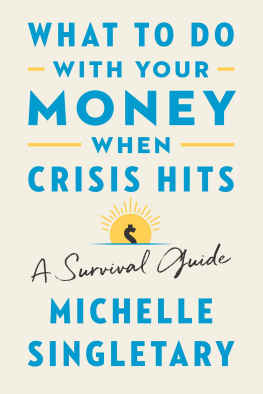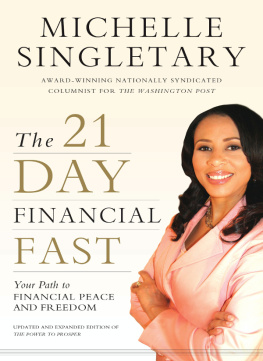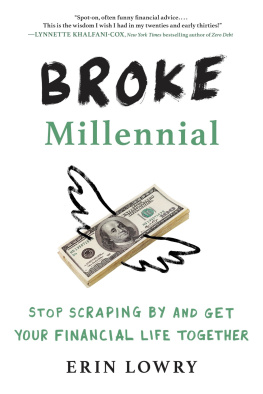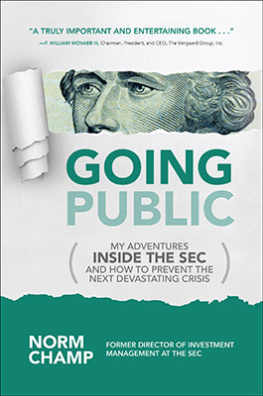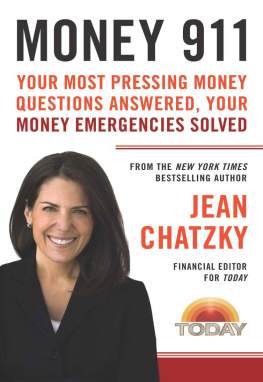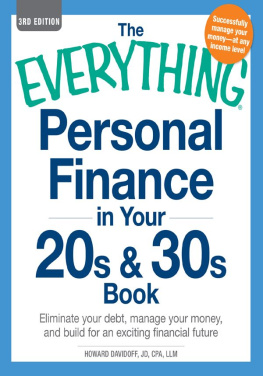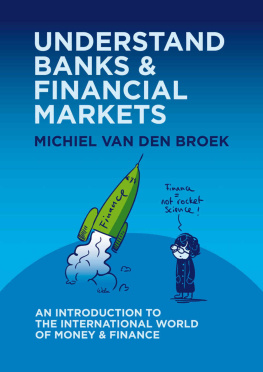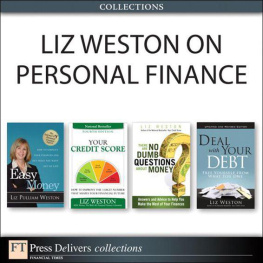THIS BOOK PRESENTS IDEAS OF ITS AUTHOR. IT IS NOT INTENDED TO BE A SUBSTITUTE FOR THE DIRECT SERVICES OF A FINANCIAL PLANNER, ACCOUNTANT, LAWYER, OR OTHER PROFESSIONAL ADVISOR. THE PUBLISHER AND THE AUTHOR DISCLAIM LIABILITY FOR ANY ADVERSE EFFECTS RESULTING DIRECTLY OR INDIRECTLY FROM INFORMATION CONTAINED IN THIS BOOK.
Copyright 2021 by Michelle Singletary
All rights reserved
For information about permission to reproduce selections from this book, write to or to Permissions, Houghton Mifflin Harcourt Publishing Company, 3 Park Avenue, 19th Floor, New York, New York 10016.
hmhbooks.com
Library of Congress Cataloging-in-Publication Data
Names: Singletary, Michelle, author.
Title: What to do with your money when crisis hits : a survival guide / Michelle Singletary.
Description: Boston : Houghton Mifflin Harcourt, 2021. | Includes bibliographical references and index.
Identifiers: LCCN 2021003073 (print) | LCCN 2021003074 (ebook) | ISBN 9780358572107 (hardback) | ISBN 9780358574286 (ebook)
Subjects: LCSH: Finance, Personal. | Financial crises. | BISAC: BUSINESS & ECONOMICS / Personal Finance / Money Management | BUSINESS & ECONOMICS / Personal Finance / Budgeting
Classification: LCC HG179 .S51447 2021 (print) | LCC HG179 (ebook) | DDC 332.024dc23
LC record available at https://lccn.loc.gov/2021003073
LC ebook record available at https://lccn.loc.gov/2021003074
Cover design by Brian Moore
Author photograph Sade Olufemi Dennis
v2.0621
I dedicate this book to anyone who has ever fallen on hard economic times, especially those who have suffered because of the COVID-19 pandemic. May you find hope when times seem hopeless.
Introduction
History has shown us that, however well the economy is doing, were always only a matter of years away from another recession or another financial crisis that pushes unemployment up and consumer spending down. Inevitably, the stock market will react in a negative direction, erasing gains and causing people to panic. Some may even contemplate moving their money to a savings account that pays a pitiful interest rate.
The 1918 influenza pandemic resulted in 675,000 deaths in the United States. There was also an economic fallout that caused losses for businesses, especially those in the service industry.
Most people know about the Great Depression, which began in 1929 and saw unemployment rise as high as 25 percent. But since then, there have been many other economic downturns that havent received the same attention or that weve simply forgotten.
The Asian flu pandemic (August 1957April 1958) coincided with a recession during the same years.
The savings and loan crisis in the 1980s and early 1990s spun the economy into a recession.
During the bull market of the late 1990s, the technology-dominated Nasdaq index soared. But by 2001, the dot-com or tech bubble burst and inflicted a lot of financial pain on people who had invested in Internet-based companies.
The Great Recession, which lasted from December 2007 to June 2009, left many wondering if homeownership was worth the financial risk. It was a brutal time. People lost their homes. Many hardworking Americans bailed from the stock market after experiencing devastating drops in the value of their retirement accounts.
A decade later, in early 2020, the COVID-19 pandemic hit the U.S., eventually causing governments and businesses to shut down. In a matter of just a few months, the fallout caused job losses in the double digits and quickly tanked a historic eleven-year rally in the stock market.
If anything, history has shown us that good financial times dont last forever. So its not a matter of if there will be another recession or economic downturn, but when.
Whats in This Book
This may sound pessimistic, but I manage my finances as if Im in a perpetual recession. Its not about being fearful. Im planning for what I know by now is inevitable. When it comes to your finances, you have to hope for the best but plan for the worst. To do otherwise is to leave yourself unprepared for the next financial crisis, which is sure to come.
During the Great Recession, I fielded a lot of questions from people wondering how to make it through the financial hard times that America was experiencing. A lot of those questions came from people who were trying to make ends meet without having any savings to fall back on. In my experience, these folks were overlooking something important. They werent taking into account the debt that theyd accumulated and just how much that debt was contributing to their financial insecurity. Debt payments can take you down at least as much as the lack of a savings safety net.
COVID-19 brought a different reason for a recession, but the financial questions were the same as during any other economic downturn.
During tough financial times, our fear drives us to make bad decisions. For example, suppose you have years until retirement but because you get jittery when the stock market drops, you sell your stocks or mutual funds. Sure, you wont experience any further losses, but youve just locked in the losses youve already suffered.
Historically, the stock market has always recovered from hard times. It drops, it hits a low point, then it rises again. If you are no longer invested in the market, you miss out on any new gains. Finally, when stocks have recovered, you jump back in, but by then youre buying high. Thats like waiting for the sale at a department store to end before buying that jacket youve been eyeing. Another example: You notice that people you compare yourself to are buying homes. Because of FOMO (fear of missing out), you rush to buy a home for yourself. Or, you see that mortgage rates are low, and you rush to purchase a home before youre financially ready.
Bad decisions like these can have a lasting impact on your financial life, create financial burdens that can linger for years, cause you unnecessary stress, and limit your choices for your future. The advice in this book is drawn from many years of experience answering questions Ive received from hundreds of individuals and couples during in-person conversations, by email, through online forums, at speaking events, and in intensive budget counseling sessions. These people have incomes ranging from nothing at all (that is, unemployed) to six-figure salaries. (Just so you know, your income does not impress me. Your net worth is the true measure of your wealth.)
When I meet with people, I require them to bring a years worth of banking and credit card account statements. Why? Because people lie to me about their financesmainly because they lie to themselves first. (Oh, I dont eat out that much. Lie!)
We talk about their debts. Often theyve separated the debts into good debts and bad debts. The uncommon truth is that there should be just one categoryits all just debt. Debt is a weight that you should aim to drop as soon as you can.
We talk about their saving habits, or lack thereof. Many people cant figure out how to even start saving. Its also important to know how much you should save, and even when its smart not to save. For instance, Im not impressed that you saved for a year for your wedding when, after the honeymoon, you come home to five-figure or six-figure student loans. Thats poor money management. Instead of saving for the wedding, pay off the loans. Then save up for a debt-free wedding celebration. Now thats being money-smart!
The advice in this book might seem harsh, difficult, or impossible at times, mostly because Im asking you to change how you think about some things. But consider this: Can you really expect your financial situation to improve if you just keep doing the same things that got you where you are in the first place? Or, will you let your fear dictate your decisions? Keep this in mind: You want to be better prepared to handle the next economic downturn than you were when the last one hit. And as Ive already said, its just a matter of time until the next financial crisis arrives.

